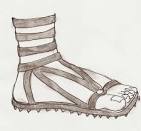Joshua 5:9 –And the Lord said to Joshua, "Today I have rolled away the reproach of Egypt from you." And so the name of that place is called Gilgal to this day.

As we noted last time, the entirety of chapter 5 centers on the children of Israel renewing their covenant with God.
God had miraculously protected and provided for Israel during their 40-year punishment of wandering in the wilderness. He graciously led them once again to the border of the Promised Land. In fact, they were more than 'at the border' - they had crossed the Jordan River and they were camped on the land that was their God given inheritance!
However, before they began the actual conquest, God directed the people to renew their covenant with him. This involved two things:
- All males must be circumcised.
- The Passover must be celebrated.
Scripture tells us that once that was done, God rolled away the reproach of Egypt from them.
But what does that actually mean? Several different explanations have been offered.
One explanation says that Israel's reproach refers to their state of impurity because they were not circumcised. God had given the rite of circumcision to his people through their father Abraham (Genesis 17:10). It was an outward sign of their purity and covenant with God. Therefore, to be uncircumcised was to be in a state of the grossest impurity and sin. We often find Old Testament references to the enemies of Israel who are contemptuously referred to as 'the uncircumcised' (II Samuel 1:20, I Chronicles 10:4, Isaiah 52:1, etc).
This explanation goes on to say that because the children of Israel did not circumcise their children during the wilderness wandering, they were as polluted and sinful as the Egyptians. However, once they renewed their covenant with God, that sinful reproach in the sight of God was removed.
Another explanation says that nation of Israel suffered reproach because they rebelled against the government authority who ruled them (Pharaoh). In essence, they were considered no more than rebels and deserters who were despised by the world. This theory states that by renewing their covenant with God through circumcision, Israel proved that their actions were not those of mere anarchists. Their liberty was restored to them by the God of heaven, which means they did not rebel against legitimate authority. Hence, they were no longer considered a reproach.
Yet another explanation sees the reproaches of Egypt as actual words that were uttered by men. This theory states that the Egyptians taunted and despised Israel as they wandered around the wilderness, because the God they claimed to serve was unable to help them acquire a settlement in Canaan (Exodus 32:12, Numbers 14:13-16). Since Israel had now actually entered Canaan and God had pledged to give them the land, the reproaches stopped.
Regardless of which theory is true (perhaps all of them are), we can be sure that God is deeply concerned about the honor of his people, because his own glory is attached to our honor and success. Notice the promise that God gives to us through the prophet Isaiah:
Isaiah 54:17 -No weapon that is formed against you shall prosper; and every tongue that shall rise against you in judgment you shall condemn. This is the heritage of the servants of the LORD, and their righteousness is of me, says the LORD.
The reproach of Israel was a prime example of God keeping this promise. Though the voices of that age rose up against Israel, God vindicated his people.
Here is some good news: God's promises have not changed! We should not be afraid to stand up for the word of God, even if his promises seem impossible. If God said it, it WILL come to pass. Those who stand firm in faith will receive the fulfillment of the promise while the voices of those who come against them will be condemned!
Scripture tells us that the place where the circumcision occurred was then renamed 'Gilgal' which means 'to roll off, to cut off or to remove'.
For Israel, Gilgal was a literal physical place. But for us it is a spiritual place because in the age of grace circumcision is of the heart, not the flesh.
Colossians 2:13 – And you, who were dead in your trespasses and the uncircumcision of your flesh, God made alive together with him, having forgiven us all our trespasses.
Because we have been cleansed by the precious blood of Christ, let us circumcise our hearts by cutting off or removing all sin and hold tightly to the ways of God. Let's not give the sinners around us a reason to mock or reproach the gospel message. Instead, let's show them the love of God and the fruits of righteousness.
Joshua 5:10 – While the people of Israel were encamped at Gilgal, they kept the Passover on the fourteenth day of the month in the evening on the plains of Jericho.
The first Passover occurred in Egypt, just before Israel departed in freedom. The second Passover was held at Mount Sinai. The celebration held at Gilgal was the third time Israel kept the Passover.
Picture that scene for just a moment – The jubilant people of Israel were camped beside the raging waters of the Jordan River. They had set up the tabernacle in their midst, sacrificed their lambs and began to eat the Passover meal. The smell of the roasted meat wafted through the air and made it over the walls of Jericho, just a few miles away. The soldiers of Jericho smelled the fresh meat and were probably angry at being tightly shut up in the city while their enemies enjoyed a time of fellowship with their God! It can truly be said that God prepared a table before his people, in the presence of their enemies (Psalms 23:5)!

I imagine it was a celebration to remember, especially since they were banned from celebrating Passover during the 40-year period of wandering (Exodus 12:48).
Let's stop and think about that ban for a minute. When Israel refused to step out in faith and take the Promised Land the first time, their sin and unbelief drove a wedge between that generation and God. Although they were still God's people, they were unable to enjoy a close covenant relationship with God and thus they could not celebrate Passover. I think all of us would agree it was a sad (and avoidable) situation.
But before we judge them, we should ask ourselves this question: Are we really any different?
The effects of sin and unbelief have not changed. They are still capable of driving a wedge between us and God. Although we may still be saved, sin/unbelief will prevent us from enjoying the close, intimate fellowship that God desires to share with us. Sin and unbelief function like ear plugs, keeping us from hearing (and seeing) in the spiritual realm and hindering the productive work that God desires for us to accomplish in his kingdom.
Mark 8:17-18 - Do you not yet perceive or understand? Are your hearts hardened? Having eyes do you not see, and having ears do you not hear?
Let's face it – Israel wasted a lot of time wandering around, doing nothing productive. I don't know about you, but I don't want to aimlessly wander around in the spiritual realm. I want to stick as close to God as possible. I want to see where he is leading and hear what he is saying. The bible refers to this as 'walking in the Spirit'.
Romans 8:4-5 - That the righteousness of the law might be fulfilled in us, who walk not after the flesh, but after the Spirit. For they that are after the flesh do mind the things of the flesh; but they that are after the Spirit the things of the Spirit.
When we walk where the Spirit leads us, we know that we are in the will of God. We can have confidence that we are accomplishing all the good works that God has prepared for us to do (Ephesians 2:10) and we are touching the lives of those who God has purposely placed in our path.

Furthermore, when each individual member of the church is committed to walking by the Spirit, we can expect God to do great things in our midst. We can expect the lost to come through the doors of our church and find Christ. We can expect people to be delivered and set free. We can expect to see all the blessings of a life in Christ, including healing, restoration and other miracles.
Are you willing to circumcise your hearts and minds in order to have that kind of a walk with Christ? Are you ready to walk by the Spirit?
Joshua 5:11-12 – And the day after the Passover, on that very day, they ate of the produce of the land, unleavened cakes and parched grain. And the manna ceased the day after they ate of the produce of the land. And there was no longer manna for the people of Israel, but they ate of the fruit of the land of Canaan that year.
As far as the timing of this event, we need to remember that the new Jewish day began at sunset. The paschal lamb would have been sacrificed before sunset on the 14th of Nisan, then immediately roasted and consumed. This means that according to the Jewish reckoning of time, the meal was actually eaten very early on the 15th day.
The next day, the 16th of Nisan, they would have dedicated some of the produce of the land to God via a wave offering (Leviticus 23:10-11). Once those first fruits were dedicated, Israel was free to eat any of the produce of the land.
Consequently, as they rose from sleep on the morning of the 17th, they no doubt realized that manna had ceased to fall from heaven. The 16th of Nisan, the day they ate of the produce of Canaan, was indeed the last day manna fell.
Manna was a temporary (and necessary) provision during the period of wandering, when no agriculture was being practiced. It was not a permanent benefit; it was a stop-gap measure peculiar to the wilderness era. Once Israel entered the Promised Land and ate of its bounty, the benefit stopped.
We can glean several lessons from the provision of manna:
- It did not come randomly or by chance as snow or rain does, but by the special dispensation and mercy of God. Notice that it began precisely when Israel had a real need for it, and it ended precisely when their need was over - when they ate of the produce of Canaan. In between those times, it arrived on schedule and without fail six days a week. Clearly, manna was a miraculous gift from God! This should give us assurance that God knows what we have need of too, and he will certainly supply it.
Matthew 6:31-33 - Therefore take no thought, saying, What shall we eat? or, What shall we drink? or, How shall we be clothed? (For after all these things do the Gentiles seek:) for your heavenly Father knows that you have need of all these things. But seek you first the kingdom of God, and his righteousness; and all these things shall be added unto you.
- The lesson of manna enforces the need for ordinary work. God granted the manna only when there was no option for Israel to farm the land and produce what she needed through normal physical labor. God is not in the habit of miraculously providing things that we can provide for ourselves through ordinary means. A wise man once noted that if you ask God for money, he is likely to send you a pair of work boots!
- In today's culture, many people believe it is the job of the government or society to take care of them. This is not a biblical view. If you are able to work, you should provide for your own needs (Ecclesiastes 5:18-19, II Thessalonians 3:0-12).
Let me ask you a question: We noted that Israel was eating the grain/produce of Canaan. But Israel only had possession of a few square miles of Canaan at this point – so where did all the corn and other crops come from?
Well, the city-kingdoms of Canaan were set up in much the same way as ours – most of the people lived in the cities while the farms were located around the perimeter of the wall. The farmers no doubt had much of last year's crop of corn stored in their barns, to use while waiting for the new crops to ripen.

When the alarm was sounded in Jericho and everyone rushed into the city to be protected from the enemy, the farmers left the corn and other provisions in their barns. All Israel had to do was go pick it up. They didn't have to spend time planting, weeding, gathering the harvest, winnowing the grain or hauling it into storage – that was already done for them!
Now here is something to consider as you meditate on God's provision this week: Manna was a temporary gift from God which aided his people in their time of need. Because it was temporary, Israel could only take advantage of it during those 40 years. God did not provide it before or after that time, because it was not necessary.
Likewise, God has given us gifts in this age (the dispensation of grace) which fulfill the unique needs we have right now. Like manna, these gifts are temporary so if you want to take advantage of them, this is your only chance.
For example, God has given us the gift of faith (the assurance that God keeps his promises, even when you don't yet see the evidence of it. See Hebrews 11:1). Scripture tells us that God has given to each person a measure of faith (Romans 12:3).
We need faith to step into the promises of God, to fight the enemy and to rescue people from the kingdom of darkness. But when we enter the next dispensation (life in heaven), faith will no longer be a part of our existence because all of heaven conforms to the will of God. So, if you want to exercise your faith and please God (Hebrews 11:6), you have to use it right now.
The gift of prayer (and heavenly prayer languages) will also cease (I Corinthians 13:8). Right now, because we are living on earth in our mortal bodies of sinful flesh, we must communicate with God through our Mediator Christ Jesus, via prayer. But once we enter heaven, sin will be completely gone and there will no longer be a need for us to pray – we can talk to God face to face. So if you want to know God intimately through answered prayer, you better start praying right now!
It has often been noted that the ability to willingly worship God during our lifetime is a gift. Once we enter eternity and see God in person, worship will not be a conscious choice – it will be an automatic response based on the awesome presence of God. So if you want to make a conscious choice to offer God a sacrifice of praise, now is your only chance.
Let me leave you with a final thought on this concept: In the natural realm, a woman establishes a relationship with the man she plans to marry. Through their interactions, she gets to know his likes and dislikes. She shares his goals and dreams for the future. She learns to trust him. She finds out how he treats her. She discovers what it will be like to become partners with him. All of this normally happens before the wedding occurs.
Scripture tells us that the church is the bride of Christ. Do you want to arrive at the marriage supper of the Lamb without knowing much about your groom? Or do you want to use the gifts God has made available to you to develop and enjoy a close, glorious bond with Jesus before you get to heaven?
Joshua 5:13 – When Joshua was by Jericho, he lifted up his eyes and looked, and behold, a man was standing before him with his drawn sword in his hand. And Joshua went to him and said to him, "Are you for us, or for our adversaries?"
All bible scholars agree that either chapter five should have ended with verse 12, or chapters 5 and 6 should have been a single chapter. There is a clear break in the text between the events of the Passover and this encounter between Joshua and God, which spills over into chapter six.
At any rate, there are many different opinions (and disagreements) about these next three verses. I will try to present all the pertinent options, and it is up to you to decide what you believe.
To begin with, there are some people who believe these verses describe a vision that Joshua had. Consequently, they do not believe that Joshua was physically standing alone near the walls of the city of Jericho. They believe he may have been sitting in his own tent surrounded by advisors as he had the vision of this 'man' with a drawn sword.
Others believe this was a real event. They believe Joshua wanted a firsthand look at the terrain outside the walls and he simply walked down to Jericho to see it. He certainly did not go alone, but his cohorts were not right beside him at the time of this encounter.
A third opinion says that Joshua was physically outside the walls of the city, where he had a vision of the man with the drawn sword.
One thing everyone agrees on is that the purpose of this encounter was to encourage Joshua. Regardless of where he was physically located at the time, Joshua was probably contemplating the upcoming attack on Jericho. Although his trust was certainly in the Lord, he was doing his part to understand the situation they faced, and to see if there were any physical advantages Israel could use. As this was occurring, God chose to send him a word of encouragement.
Whether in a vision or in real life, Joshua must have been surprised to see this warrior. Suspecting that he was a Canaanite general on his way to reconnoiter the camp of Israel, Joshua boldly confronted him and asked his purpose for being there.
Joshua 5:14 – And he said, "No; but I am the commander of the army of the Lord. Now I have come." And Joshua fell on his face to the earth and worshiped and said to him, "What does my lord say to his servant?"
Everyone also agrees that in answer to Joshua's question, this 'man' denies being either an Israelite or a Canaanite.
The next major argument over this passage centers on the identity of the unknown warrior. There are two possible answers.
The first is that this 'man' was a high-ranking warrior angel of God (possibly Michael the archangel), who was a general in God's army. This angel intimates that his purpose is to lead Israel in the coming battle at Jericho, which means that God was going to overthrow Jericho by divine means.

Those who believe him to be an angel point out that he represents himself as being separate or different from God. They also point out that the angel says he has 'now come'. In their opinion, this cannot refer to God because he has always been with Israel.
The second theory identifies this 'man' as Jesus himself. If this is the case, then we have an instance of what is called a theophany – a manifestation of God to mankind by actual appearance in a tangible or recognizable form. There are several such theophanies recorded in the Old Testament.
(Many of the scholars who believe this was Jesus also believe that he adopted the form which he later took when he came to earth to pay for the redemption of man, although this cannot be proved.)
Those who believe him to be Jesus point out that he is specifically referred to as 'Jehovah' or 'the Lord' in Joshua 6:2, which means he was not a created angel. As to the argument that he has 'now come', this viewpoint maintains that that phrase simply refers to the current reason for his manifest presence; it does not imply that God had left Israel at any time.
There is also the issue of the 'worship' this being receives from Joshua. We know that Joshua falls to his knees and bows his head before this 'man'. We also know that a true angel of God will never allow a human to give him divine worship (Revelation 22:8-9).
However, those who consider the 'man' to be an angel say that Joshua's actions do not constitute divine worship. Back in that day, Orientals often showed honor and respect to their superiors by bowing before them (II Samuel 9:6, 14:33). They believe Joshua's actions merely reflect his acknowledgement that this angelic being was superior to him in strength, wisdom and power. As such, he deserved to be honored by Joshua.
Of course, those who believe this was Jesus say Joshua was giving God the worship he deserved and that every single one of us will bow before the person of Jesus when we finally behold him.
Joshua 5:15 – And the commander of the Lord's army said to Joshua, "Take off your sandals from your feet, for the place where you are standing is holy." And Joshua did so.
As mentioned previously, those who believe this was an angel consider the removal of shoes as a token of reverence and respect paid to a superior person or being. It would be kind of like removing your shoes when you went into the house of a friend.
 However, others point out that the person who spoke to Joshua uses the same language as the one who spoke to Moses out of the burning bush, and he gives Joshua the same command – to remove his shoes (Exodus 3:15). This indicates that the place was made holy by the presence of God, and thus this 'man' was none other than Jesus.
However, others point out that the person who spoke to Joshua uses the same language as the one who spoke to Moses out of the burning bush, and he gives Joshua the same command – to remove his shoes (Exodus 3:15). This indicates that the place was made holy by the presence of God, and thus this 'man' was none other than Jesus.Even though there are disagreements about these verses, there are still many points that we all accept as true. Just as the visitation of God strengthened and encouraged Moses to lead Israel out of Egypt, it now encouraged Joshua in his arduous task of expelling the Canaanites from the land and establishing Israel in her inheritance. In fact, anyone who draws near to God will find that he is always nearby, ready to hear and to assist us as we fight the battles of this life.
The raised sword of the warrior indicated that God was going to fight for Israel and give her the victory. None of the kingdoms of Canaan could stand against the Lord. When God draws his sword to give us victory over our enemies, no power of hell will be able to stand against us (Matthew 16:18).
When God speaks to us, we must be attentive to his commands just as Joshua was. God has already revealed many of his commands to us through his word; we must endeavor to live by his laws as we wait further instructions from him.
If we acknowledge Jesus as Lord, we must be ready and willing to immediately bow before him and assume the role of his servant in all areas of life. His will must become our will.
Let me offer you some encouragement and relief:
Joshua was over 80 years old when God put him in charge of leading Israel into the Promised Land. What a daunting and impossible task it must have seemed! Indeed, without the help of the Lord, it would have been a failure.
God often calls us to do the impossible because it forces us to partner with him to get the job done. It causes us to lean upon him for wisdom, understanding, strength and breakthrough. That way, when success comes, the glory and honor go to God alone.
So, if you feel like God is calling you to do the impossible, don't be afraid - be encouraged! He will be right there with you, leading you every step of the way.
And remember - he is giving you an incredible opportunity to partner with him on this side of glory. You will form a deeper trust and faith in him through this experience.
Let me offer you some strength:
All Christians need to be mindful of their own personal holiness. If we allow sin and unbelief to dwell in our lives, it will prevent us from walking closely with the Lord. It will dull our spiritual hearing and darken our spiritual sight.
Even though we know this, most Christians continue to hold on to certain sins. Perhaps this is because it is painful and challenging to 'cut away' or remove these things from our lives.
If you feel Holy Spirit prompting you to circumcise some area of your heart, you can be sure that he will be with you as you go through the process. If he has called you to do it, he will also strengthen you to be able to make the change. In the end, you will be glad you did!
